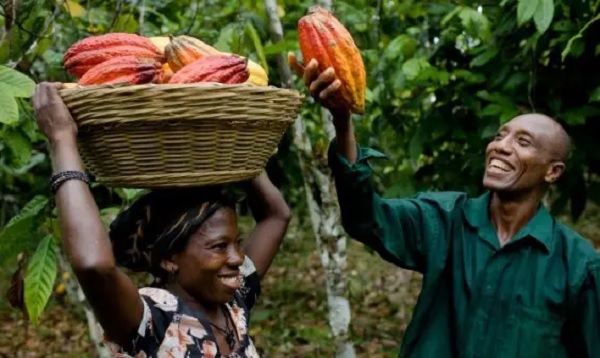Scores of cocoa farmers in the Western North Region of Ghana have heaped praises on the Akufo-Addo-led government for the introduction and successful implementation of the National Cocoa Rehabilitation Programme.
The cocoa farmers contend that but for the programme many of them would have lost their only known source of livelihood and that would have left them impoverished and pushed them into abjection.
President Nana Addo Dankwa Akufo-Addo in September 2020 launched the National Cocoa Rehabilitation Programme.
Under the Programme, the Ghana Cocoa Board (COCOBOD) bears the full cost of the a two-year rehabilitation process which involves the cutting of cocoa trees affected by the Cocoa Swollen Shoot Virus Disease, treat the whole farms and replant them with disease-tolerant, early bearing, and high yielding cocoa varieties.
COCOBOD will go ahead to give GH₵1,000 per hector to each farmer affected by the disease. In the case of tenancy, both affected tenant farmers and their landowners are compensated.
Chief Executive Officer of COCOBOD Joseph Boahen Aidoo, some board members of COCOBOD together with staff paid a two-day visit to selected rehabilitated farms in the Western North Region of Ghana to assess the impact of the programme and also announce other measures to enhance and sustain it.

At Bankyease Kumikrom in Sefwi Anhwiaso Bekwai, the Programme had rehabilitated a 164-hectare cocoa farm which was heavily ravaged by the Cocoa Swollen Shoot Virus Disease (CSSVD).
“Three years ago, this 364.5 acres of cocoa farm belonging to 73 farmers was lost to the CSSVD. So we had to sit with the farmers involved to negotiate with them based on which they were duly compensated,” Sefwi Bekwai District Cocoa Officer Frank Amamo-Antwi briefed Joseph Boahen Aidoo and his team.
“We cut the farm for them, planted 162,800 plantain suckers as well as 162, 800 cocoa seedlings all for free. COCOBOD came in with 91 rehabilitation farm hands to maintain the farm including sometimes watering the cocoa trees. Currently the farm is fruiting and by May 1, this farm will be 3 years. So in the next four to five years, we hope to bring cocoa in this area back to its enviable position of being number one in cocoa production. One acre, we are expecting 15 bags so when you do the maths Ghana is in for glory times.”
Mary Eghan and the husband are beneficiaries of the National Cocoa Rehabilitation Programme at Bankyease.
According to her, they were at their wit’s end when their farm was affected by CSSVD.
“We have been cultivating the farm for years. It was everything to us. So we were devastated when the farm was affected. In fact, we were more worried when the officers told us about the programme and the fact that the farm will be cut. We were very hesitant I must confess. But we decided to give it a try after many sensitization engagements. The result is amazing. We are so hopeful that in the coming years, we will get more bags than what the old farm was giving us.”
Scores of farmers who had thronged the farm upon the arrival of the team told 3news.com stories of how they were also hesitant in joining the Programme and rejoiced that “our bets have paid off”.
For many of them they wondered what would have happened to them and their economic disposition, in the last three years, if they had not joined the Programme.
To show their appreciation to the Akufo-Addo government, Chief Executive Officer of COCOBOD Joseph Boahen Aidoo was installed the development Chief for the area.

At Essam Adabokrom in Bia West, the National Cocoa Rehabilitation Programme had rehabilitated a 1391.22 hectare cocoa farm for some 489 farmers.
The beneficiary farmers shared similar stories of how doubtful they were initially when the Programme was introduced to them and applauded government for the initiative while entreating them to sustain it.
“The Programme has been helpful. Even before the farm pods, we are getting benefits. The thousands of plantain suckers we planted have matured and every day we are selling. Now apart from cocoa, we are also producing thousands of plantain for the various markets. It will interest you to know that some of our buyers come from neighbouring Ivory Coast. So while we wait for our cocoa, we are at the moment cashing in heavily on the plantain,” Michael Owusu said.
For Chief Executive Officer of COCOBOD, he was delighted about the “encouraging testimonies you are telling all of us and this only motivates us to do more and that is exactly what we are going to do”.
“This government understands what the farmer goes through. It appreciates the sacrifices of our gallant farmers. It is well aware of the potential in Agriculture. So when we set out on this course, we were clear in our minds what the end gains will be. Today, we will look back and say the Cocoa Rehabilitation Programme is indeed a game changer.”
He announced that government is introducing other interventions to ensure that the Programme is enhanced and sustained.
“Cocoa farming depends on water. What we do is rain fed agriculture. And so you can see that the development of this farm should have gone better than we are seeing now and also because in the past months we have not had any rainfall. And it has affected the progress of this farm. So with climate change, what we want to do is to bring in irrigation. Already we have started the procurement process…”
Source: 3news.com|Ghana

